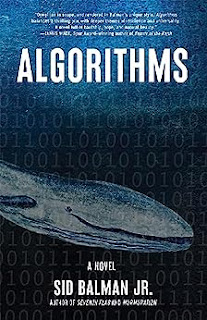Sid Balman Jr. is the author of the new novel Algorithms, the third in his Seventh Flag trilogy. Also a journalist, he is writer in residence at Sul Ross State University. He lives in Alpine, Texas.
Q: Algorithms is the third in your Seventh Flag trilogy--how would you describe the connections among the three books?
A: There is both a physical connection, the story, and a metaphysical connection, the message.
The story focuses on several generations of two families from the tiny West Texas town of Dell City: two clans essentially, one white, the other Syrian Muslim, as they unite in all ways to build a ranching empire after World War II on the high desert of a mythical and iconic slice of America.
In the ensuing 100 years – the final novel, Algorithms, peers 30 years into the future after the fall of civilization as we know it – they journey through wars, resource disputes, bar brawls, torrid love affairs, terrorist threats, climate crises, revolution, and, ultimately, the disintegration of modern civilization.
Underlying it all is the historical message of what has happened, or could happen, to the American dream, under assault by division, radicalization, and the existential threat to the foundation of governance, equality, and equity.
Algorithms represents a profound evolution in my thinking about the journey of the two families, due in large part to a gifted content editor who opened my eyes to a different path for the tale. The insoluble connection between humans and nature, what I call the Terra-Algorithm in the novel, embodied in the resiliency of indigenous people, is the best hope for humanity.
While some might view Algorithms as tale of darkness, I think of it as a convincing argument for optimism.
Q: Jill Gibson, editor of the Los Alamos National Laboratory National Security magazine, called the book “A post-apocalyptic western that is equal parts Cormac McCarthy and Larry McMurtry.” What do you think of that description?
A: Reviews can be frustrating, but in my view Jill captured the true ethos with that comment and the comparison to authors I consider among the finest modern storytellers. It goes back to my comment about darkness and optimism, dominant themes in very different styles from McCarthy and McMurtry. Think The Road and Lonesome Dove, journeys of desperation, violence, redemption, and ultimately hope.
Q: How was the book's title chosen, and what does it signify for you?
A: We shouldn’t judge a book by its cover, but most readers do, at least initially, which is why the title and jacket art are critical.
My content editor first suggested Algorithms, a clever literary trump-l’oeil, an illusion or feint, that is meant to influence the readers perception of the story. But while algorithms and artificial intelligence hasten The Fall of Civilization, it is what I call the Terra-Algorithm, the intimate bond between nature and humankind embodied in indigenous people, that saves it.
Q: Did you know how the novel--and the trilogy--would end before you started
writing it, or did you make many changes along the way?
A: The simple answer is no. Allowing a story and its characters to grow organically is one of the most beautiful parts of writing a novel, at least to me. So different from the decades I spent as a war and national security correspondent based in DC.
Of course, like all novelists, I put lots of time and effort into character profiles and story outlines. But sometimes, like a love affair, the characters and the stories tell you they want to go a different direction. And it’s an important part of my art, and my personal relationships, to let them. Hold what you love with an open hand.
Q: What are you working on now?
A: I have begun my process for the next novel, titled The Mural, in collaboration with my content editor from Algorithms. The Mural is fiction, but based on the tragic shooting in Uvalde, Texas, where there are murals around the town square of the deceased. The central character is an older man from the fictional town where the murders take place, who, after decades restoring art in Europe, is commissioned to do a mural of a victim in the shooting.
Embedded in the story will be themes from the Trilogy – radicalization, citizenship, personal freedoms, violence, guns, and modern sexuality.
While I have spent my life reporting on and studying violent radicalism, my research into The Mural and the time I have spent with the families has altered my views. Certainly, mental health, abuse and inequity drive extremism.
But I am realizing that there is another factor that fuels alienation, mental illness, and violent acts, one that will be a central theme in The Mural. A dearth of platonic love – empathy and emotional intimacy toward one’s fellow human – is being squeezed out of a modern world in which pornography, obscenity, and detached social media has largely replaced meaningful relationships, particularly for younger people.
Q: Anything else we should know?
A: Algorithms was released Aug. 1, and is available at any local independent bookstore or on Amazon. My content editor and I will have signings and discussions at a number of bookstores and other venues throughout the country, including Aug. 5 at Old Town Books in San Angelo, Texas; Aug. 6 at Pecan Town Books in Seguin, Texas; Aug. 10 at Interabang Books in Dallas; and Aug. 12 at Burrowing Owl Books in Amarillo.
Thank you, Deborah, for the opportunity to connect with your readers.
--Interview with Deborah Kalb. Here's a previous Q&A with Sid Balman Jr.


No comments:
Post a Comment